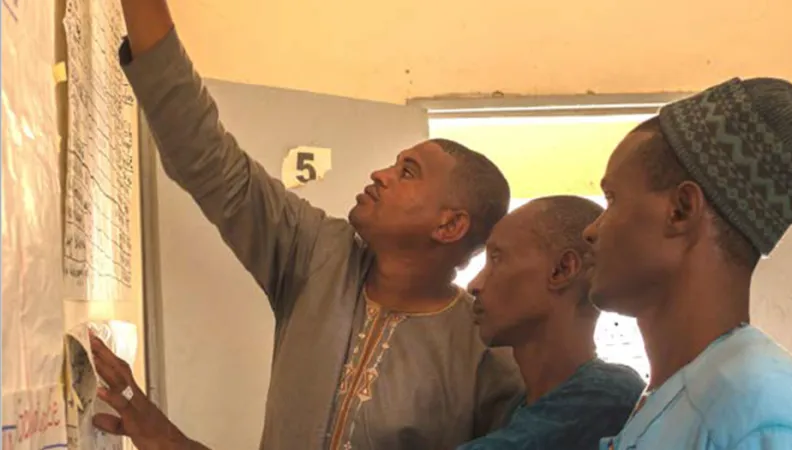Share the page
Frequently asked questions

Find all the answers to the most frequently asked questions about FFEM and how it works.
Given the large number of projects in preparation, the FFEM is not able to receive new project proposals for funding until the end of 2026.
We invite you to follow our news and regularly consult our website www.ffem.fr to be informed of the resumption of project submissions or new calls for projects, following the preparation of the new strategic programming 2027-2030.
All projects submitted to the FFEM must demonstrate that they meet the following nine criteria:
- contribution to the preservation of the global environment;
- contribution to local sustainable development in one or more developing countries;
- innovative nature;
- demonstrative and replicable nature;
- economic and financial sustainability after the project;
- overall ecological and environmental viability;
- social and cultural acceptability, particularly through local ownership;
- adequate institutional framework;
- monitoring and evaluation system.
For each proposed project, particular attention will also be paid to:
- theory of change;
- partnership dimension;
- consideration of inequalities, women, youth, and vulnerable populations;
- knowledge sharing resulting from the project;
- sustainability of funding and co-financing.
Applied research activities leading to, or linked with, development activities may be funded by the FFEM. Fundamental research activities, however, are not eligible for financial support from the FFEM.
The FFEM operates in any developing country eligible for official development assistance. Priority is given to the African continent, with a target of committing around two-thirds of FFEM resources.
With the exception of Wallis and Futuna, French overseas territories are not eligible for official development assistance. However, the FFEM may participate in the funding of regional projects related to the preservation of the global environment that include French overseas territories alongside eligible countries. In such cases, the share of funding allocated to French overseas territories may not exceed 25% of the FFEM’s contribution to the project.
Each project or programme co-financed by the FFEM is presented to the steering committee under the responsibility of one or more of the six member institutions, which supports or support the project, with the assistance of the Secretariat. Therefore, to submit a funding request to the FFEM, the project proponent must obtain formal support from one of the six FFEM member institutions.
In order for the FFEM to assess a project idea, the project proponent must first draft a Project Opportunity Note (NOP).
Any legal entity may submit a project, provided that it falls within the mandate and guidelines of the FFEM and meets the eligibility, funding, and geographical criteria described on the Submit a project page.
The comparative study of compensation standards conducted by the Ministry for the Ecological Transition (MTE) is based on an analysis of five fundamental criteria (Measurability, Verifiability, Permanence, Additionality, Uniqueness) and three additional criteria (Respect for human rights, Inclusion of environmental, social, and economic co-benefits related to the project, and alignment with the Sustainable Development Goals (SDGs) of the UN 2030 Agenda). The evaluation of projects by the FFEM involving a “carbon finance” component will follow this framework, with the aim of highlighting five principles:
- Multi-benefit projects, rooted in a “territorial” or “value chain” approach;
- Robust certification;
- Transparent, participatory governance that supports scaling up;
- Fair and transparent distribution of benefits;
- Compensation as a last resort in the “Avoid-Reduce-Compensate” sequence.
- Read the Note for project proponents
The PPI programme, managed by the French Committee of IUCN, directly supports African civil society.
A French NGO is not eligible for the PPI; the initiative must be submitted by a local NGO by completing the project submission form as part of the PPI calls for projects. However, the French NGO may act as a co-financier of the local initiative.
More information is available on the PPI website.
The FFEM's resources amount to €132 million for the period 2023-2026.
Supplemented by the state budget, FFEM's financial resources are renewed every four years. They enable France to continue and expand the implementation of innovative actions that integrate global environmental issues into development projects in emerging and developing countries.
To submit a project to the FFEM, the project proponent must contact one of the six member institutions of the FFEM Steering Committee, namely:
- The Ministry of the Economy, Finance and Industrial and Digital Sovereignty
- The Ministry for Europe and Foreign Affairs
- The Ministry for the Ecological Transition and Territorial Cohesion
- The Ministry of Higher Education and Research
- The Ministry of Agriculture and Food Sovereignty
- The French Development Agency (AFD)
Contact details of the representatives of these institutions are available on the Governance page.
To contact our Secretariat, we invite you to complete the dedicated contact form, specifying the subject of your message.
For recruitment-related matters, we invite you to consult the “Join us” section on the www.afd.fr website, where you will find all current internship and job opportunities within the FFEM.
The Innovation Fund for Development (FID) and the French Facility for Global Environment (FFEM) are two instruments aimed at supporting innovation, experimentation, and knowledge sharing, hosted by AFD.
Although there are strong links and regular exchanges between the two teams, they differ significantly in their mandates, how they identify innovative projects, and their funding approaches.
The FID’s mandate is to fight poverty and inequality, regardless of the sector. The FFEM’s mandate is to preserve the global environment and support development.
There are intersections between these two mandates in areas such as climate, agriculture, and waste management, but the type of funding offered by each fund largely mitigates the risk of overlap:
- The FID funds very early-stage innovation development (preparatory and pilot stage 1), for amounts below €200,000, which the FFEM does not cover (except in rare cases);
- For amounts above €200,000, the FID requires a pre-existing or planned impact evaluation with a counterfactual; whereas FFEM-funded projects, starting at a minimum of €500,000, must include results monitoring and evaluation, but not necessarily an impact evaluation with a counterfactual.
Lastly, the FID and FFEM differ in how they identify innovative projects: the FID has a continuously open online call for proposals, while the FFEM mainly identifies projects on a rolling basis, sponsored by the member institutions of its steering committee.
These two funds are therefore fully complementary, and strong synergies exist between them.
No, this information is incorrect. The FFEM is currently not conducting any call for projects in 2025. We invite project leaders to refer exclusively to our official website for any reliable information regarding our financing terms and open opportunities.





